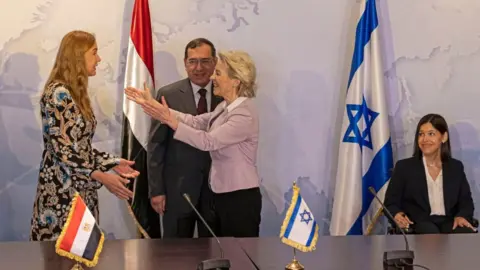EU eyes Israeli natural gas in deal with Egypt
 AFP
AFPEU nations seeking to reduce their reliance on Russian gas because of the war in Ukraine may soon be able to source supplies from Israel instead.
On Wednesday, the EU, Israel and Egypt signed a provisional natural gas export deal at an energy conference in Cairo.
The Israeli gas is expected to be sent to liquefaction plants in Egypt, then shipped north to markets in Europe.
Israel's energy ministry said it would allow significant exports of Israeli gas to Europe for the first time.
Under the framework agreement, the EU will also encourage European companies to take part in Israeli and Egyptian exploration tenders, the ministry said.
Officials said exports of liquefied natural gas (LNG) to Europe were likely to rise under the deal, but it would probably take a couple of years before shipments could be expanded.
The EU imported about 40% of its gas from Russia last year and is expected to remain a big gas consumer until about 2030.
After that, it will seek to use less gas, with the aim of achieving zero-emission status by 2050.
The memorandum of understanding was signed by Israel's Energy Minister, Karine Elharrar, along with Egypt's Minister of Petroleum, Tarek El Molla, and the EU's Energy Commissioner, Kadri Simson.
"Today Egypt and Israel make a commitment to share our natural gas with Europe and to help with the energy crisis," said Ms Elharrar afterwards.
European Commission President Ursula von der Leyen, who was also there, described it as "a big step forward in the energy supply to Europe".
"I see it as a first step leading to a Mediterranean-wide agreement, because I see that the energy supplies, [which] were mostly traditionally in the northern part, now are shifting towards the global south and east," she added.
